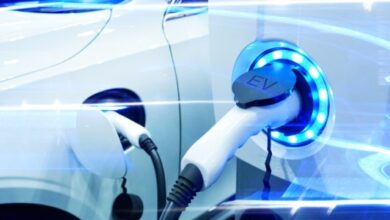$100M to help auto parts makers prep for EVs

Washington — The Biden administration will provide $100 million for small and medium-size auto parts manufacturers to upgrade their facilities and train their workforce, according to the White House.
Vice President Kamala Harris is expected to announce the move Monday during a visit to Detroit.
The funds are the latest in a series of recent investments and initiatives meant to spur a transition to electric vehicles.
That transition has become a key political issue in Michigan, the longtime heart of the U.S. auto industry and a crucial swing state in the 2024 presidential election. The Biden administration, knowing that, has made several similar announcements aimed at Michigan recently and is deploying top surrogates alongside Harris for the announcement.
Of the new funds, the Energy Department’s Automotive Conversion Grant program will receive $50 million to help small and medium-size suppliers convert from manufacturing parts for internal combustion engine vehicles to manufacturing parts for the EV supply chain.
The program, according to the White House, aims to “keep good, good-paying and union jobs in the same communities as automakers and auto suppliers transition to electric vehicle manufacturing here in America.”
The Energy Department’s Industrial Assessments Center Implementation Grants Program will get the other $50 million to help auto suppliers “improve their facilities’ energy and material efficiency, cybersecurity, or productivity, or reduce the greenhouse gas emissions,” the White House said.
The programs are funded by the Inflation Reduction Act and the Bipartisan Infrastructure Law, respectively.
Harris is also expected to announce new efforts from the Small Business Administration to facilitate private investments into the EV supply chain and expand the lines of credit available to small businesses through the SBA.
“These actions build on the Biden-Harris Administration’s ongoing commitment to ensuring that the workers and businesses that built the auto industry remain community anchors for generations to come,” the White House said.
The vice president will be joined by Gov. Gretchen Whitmer, Department of Energy Secretary and former Gov. Jennifer Granholm, Acting Secretary of Labor Julie Su and Congressional Black Caucus Chairman Steven Horsford, D-Nev.
Democratic U.S. Rep. Shri Thanedar of Detroit and Michigan Lt. Gov. Garlin Gilchrist II will attend as well.
The Biden administration, and the president’s campaign staff, have made several trips to Michigan in recent months.
The president visited Metro Detroit in February and Saginaw in March. He will return this month to be the keynote speaker for the NAACP Detroit Branch’s 69th annual Fight for Freedom Fund Dinner on May 19.
The Energy Department, meanwhile, unveiled a training program for battery plant jobs when Granholm came to Michigan in March.
Last month, though there was no Michigan visit, the Biden administration announced a new workforce hub meant to train or retrain workers in the state for EV-centric jobs through apprenticeships, high school programs and community colleges.
More:Electric vehicle ‘workforce hub’ coming to Michigan, White House says
Former President Donald Trump has repeatedly slammed Biden’s policies promoting electric vehicles. During a campaign rally in Freeland last week, he said they would bring “an economic bloodbath.”
He pointed out the high price tag for most EVs and their inferior range compared to gas-powered cars.
“If I want to drive from Michigan, let’s say to Mar-a-Lago. What do I have to do, stop seven times? The whole thing is ridiculous,” Trump said.
Most automakers have publicly acknowledged that the shift to electric vehicles is an inevitable industry trend, though many have lobbied the Biden administration to allow for a slower transition and for government assistance.
Jonathan Smith, a senior deputy at Michigan’s Department of Labor and Economic Opportunity, applauded the Biden administration’s work to prepare the state’s workforce for the mounting EV transition.
“We’ve always sort of been in this position where we’re just scrambling to respond,” he told The Detroit News, referencing previous challenges for the auto industry, namely the 2008 financial crisis.
“This really feels like one of the first opportunities we’ve had to really get out ahead of a problem in a while.”
@GrantSchwab



